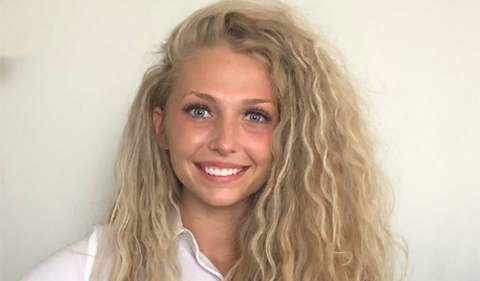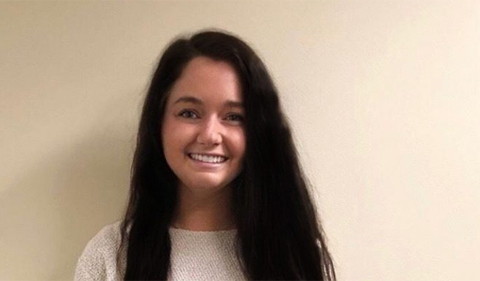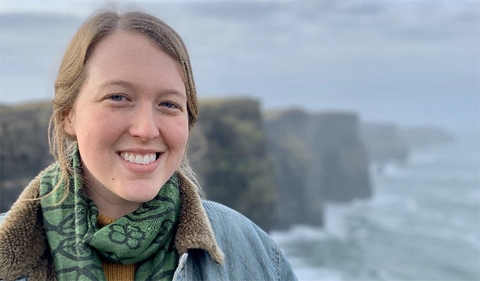Editor’s Note: The Happy Beginnings series features recent College of Arts & Sciences graduates who are getting started in careers, graduate school and service.
Three OHIO students who began their path in Athens in the Center for Law, Justice & Culture will continue their education within law and society studies by pursuing a master’s in Law, Justice & Culture.
Jada Sparks, Brea Muzykoski, and Kristin Tate are all members of the graduating class of 2020, and are members of the Certificate in Law, Justice & Culture program.
Sparks and Tate are both graduating with degrees in Sociology-Criminology and Political Science Pre-Law. Muzykoski is graduating with degrees in Political Science Pre-Law and African American Studies, as well as a certificate in Diversity Studies.
Their Connection to Law, Justice & Culture
While all three found the certificate program eventually, they encountered the opportunity in different ways. Muzykoski was first introduced to the Center for Law, Justice & Culture through a happy accident.
“I had intended to join the Pre-Law Learning Community with Director Larry Hayman: however; when it came time to enroll for freshman courses, it was at capacity. Instead, I elected to join the Law, Justice, and Culture Learning Community with Director Dr. Haley Duschinski. It was in this learning community that I was introduced to the corresponding certificate program which I was eager to be a part of.”
Tate found the program through her time with the Ohio University Mock Trial team, which is housed in the Center for Law, Justice & Culture.
“I was accepted into the Mock Trial team my sophomore year and heard everyone on the team talking about the certificate. At the time, I was looking to explore different subjects that were still centered around law. It sounded like a great opportunity and it was something I was truly interested in.”
Meanwhile, the study of law and society that is found within the certificate program is what compelled Sparks to join.
“I was drawn to the program because of the opportunities and requirements the certificate presented. I was also a member of a few student organizations where many of my peers were a part of this certificate program and saw this as a way to continue forming a bond with students whom share the same interests as me, as well as a chance to connect with Dr. Duschinski and Larry Hayman,” Sparks says.
Student Organizations’ Roles in Their Undergraduate Careers
Tate was a member of three organizations housed within the Center for Law, Justice & Culture: Phi Alpha Delta, the Ohio University Mock Trial Team, and the Ohio University Chapter of the ACLU. In the past year, Tate served as vice president of OHIO Mock Trial and as the deputy director of the ACLU-OU.
“These were all wonderful organizations that combined my passion of law, justice and sociology. I made lasting friendships as well as organizational, leadership and service skills that I just could not get out of a class room,” Tate says.
Sparks was also a member of the OHIO Mock Trial team, and she also led the Ohio University arm of the Ohio Innocence Project for the past two years. Sparks was one of the founding members of OIP-u.
“Mock Trial allowed me to comprehend the work that an attorney must put in to prepare for a trial, and gave me a firsthand experience of law in practice. I felt as though Mock Trial was preparing me ahead of time for law school,” she says.
“Within OIP-u, I was able to work directly with the Ohio Innocence Project staff to plan events in which exonerees were able to come speak to students about their experiences with wrongful conviction, or where Ohio Innocence Project staff members were able to come talk to students about the incredible work that OIP accomplishes. This organization is the reason I am so sure about what I want to do with my future and I am so grateful for the opportunities and connections it presented me,” Tate says.
“I always knew I wanted to practice law, but was never really sure which path I wanted to follow in that field. Leading OIP-u made me passionate about the issue of wrongful conviction and I have known since that I want to make a difference in these innocent people’s lives.”
CLJC Affiliates Who Shaped Their Time at OHIO
Tate cites Dr. Jennifer Fredette of the Political Science Department as a faculty member who helped shape her time in Athens.
“I have taken every one of Dr. Fredette’s classes and would do it all over again if I had the chance. Dr. Fredette gave the best lectures and was amazing at moderating class discussions on very sensitive topics,” Tate says.
For Sparks, it was Larry Hayman, esq, Pre-Law Advisor of the Center for Law, Justice & Culture.
“If it was not for Larry, my time spent at Ohio University would have been extremely different. He presented me with so many amazing opportunities that I am forever grateful for,” Sparks adds.
Sparks assisted Hayman as a program assistant in the Summer Law and Trial Institute, and worked with him in both OIP-u and and OHIO Mock Trial.
“Those were all opportunities in which he presented me with and they allowed to me to have the connections I have in the legal field and that shaped me into who I am and what I am passionate about,” Sparks says. “Larry also was the best when it came to advice about my future or about life in general. The door to his office was always open for me to come in and vent or ask questions about law school, internships, my legal interests, and so forth.”
Sparks also cites Dr. Holly Ningard in the Sociology & Anthropology Department.
“I formed such a great bond with her in her courses; I took five of her courses during my time here at Ohio University. She often talked to me often about my future, and worked with me on making my OIP-u events a success. I owe the CLJC big time for allowing me to cross paths with her,” Sparks says.
As for Muzykoski, she found mentors in Dr. Daniel Moak of the African American Studies Department, and Dr. Vincent Jungkunz of the Political Science Department.
“Dr. Jungkunz has instilled a love for higher education within me. His ability to connect and support his students is unparalleled,” Muzykoski adds.
“Dr. Moak has been an invaluable resource during my three years of undergrad. Dr. Moak has watched me grow from a curious freshman in his Intro to African American Studies course to a confident scholar conducting my own research as I prepare to complete a Master’s thesis this coming year.”
Formative Law, Justice & Culture Course Offerings
Across the numerous different departments that the Certificate in Law, Justice & Culture, the three students have found different courses that have furthered their curiousity and positively affected their time in the certificate program.
Tate’s favorite class was Human Rights, Law and Justice in Northern Ireland, which is a study abroad program during spring break led by Duschinski. Tate’s trip for the course was her first time abroad, and it gave her a new experience on international justice.
Muzykoski’s favorite courses included Race in the Criminal Justice System taught by Moak and Politics of Visibility and Critical Race Theory, which are both taught by Jungkunz.
Additionally Muzykoski cites United States Constitutional Law—Pre-Civil Rights Movements with Dr. Patricia Gunn. “This course was the most rewarding class I completed during the program. It was the most challenging class I have ever taken. I have found that nothing beats the feeling of working your hardest in a course and finishing knowing you have mastered the material. It has given me confidence in my abilities to understand case law in addition to confidence in my ability to face a challenge head-on and be successful.
For Sparks, it was Police and Society with Ningard. “While I truly enjoyed every class I took that was within the Certificate offerings, my favorite class was Police and Society. We learned about police training and decision making, police and minority relations, as well as police misconduct. Being President of OIP-u, I knew I would enjoy a class that discusses police misconduct, as this course discussed law enforcement in relation to wrongful conviction.”
What the CLJC Means to Them
As for what the Center for Law, Justice & Culture has meant to them, each graduate has nothing but kind words to say. Tate is grateful for the people she’s met and the experiences she’s found. “The CLJC has helped me realize that there are many ways to help people and many issues that are important to me. It helped me realize that the best way to put my skills to use was to go to law school and become an attorney.”
Muzykoski is grateful for the CLJC’s assistance in finding her path forward.
“My time in the certificate program has been transformative both personally and academically. I entered college with a focus on law school; however, after spending time in the CLJC, my passions shifted from law school to research. I am passionate about prison reform and reentry services. The certificate program allowed me to tailor my learning experience toward my passions. There are many things that make Ohio University home. The Center for Law, Justice, and Culture is central to me,” Muzykoski says.
Sparks mentions the community she found within the CLJC.
“I am extremely grateful for the Center and the people involved,” she says. “When I was stressed about classes or life in general, I often found myself walking into the CLJC for a breath of fresh air. My peers who understood what I was going through were always there to talk me through it and make me laugh. I could not be more thankful for the people that are a part of this program. They really helped my time here at Ohio University be as amazing as it was.”
Why They Chose the Master’s in Law, Justice & Culture
Tate chose the master’s in Law, Justice & Culture to help further prepare her and challenge her before she heads to law school.
“I wanted a taste of what law school will be like and I was not ready to stop my academic studies in political science, sociology and law & society. I feel as though I still have so much to learn before going to law school and this program was just the perfect thing for me,” Tate says.
Muzykoski found her calling in law and society studies. “During my time as an undergraduate student at Ohio University, my education has given me purpose. I feel it is my responsibility to return an aspect of purpose into the educational field, and challenge myself through the master’s program. I have always wanted to further my education beyond my Bachelor’s degree.”
“Initially, I intended to complete a Master’s program at a different institution in Ohio as a change of pace. However, after spending three amazing years in the CLJC, I do not think my ambitions could have been cultivated and supported as fully at any other institution.”
For Sparks, she felt as though there was more to learn. “When choosing if I should go straight to law school or obtain my master’s in Law, Justice, and Culture, I realized I wanted to explore more subjects that this program has to offer before embarking on my law school journey.”
“I knew that the master’s program would challenge and prepare me for my future as well as the certificate program did, and it would challenge me at a graduate level. I am confident that this master’s program will do nothing less than allow me to grow as a student and prepare for my future endeavors.”






















Comments